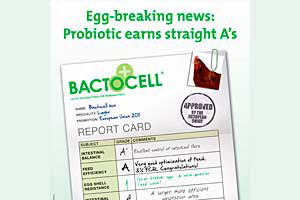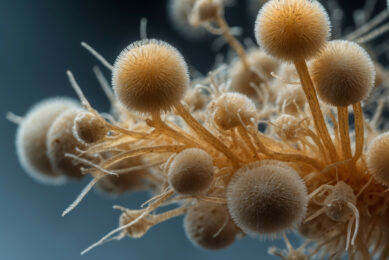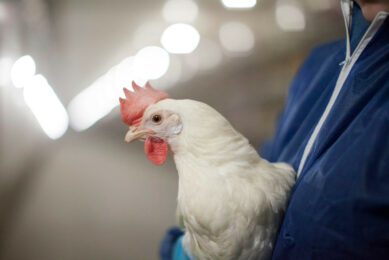Lallemand presents probiotic benefits at research congress

Lallemand Animal Nutrition presented new studies demonstrating the benefits of Bactocell on hens, duck and broilers performances at the Annual French Poultry Research Congress
Bactocell, a natural and registered probiotic solution, can help improve laying hens, fattening ducks and broilers zootechnical performance, certainly through a better feed utilisation, offering better return on investment to the poultry producer.
Bactocell is authorized as a feed additive in Europe for laying hens and chickens for fattening (Bactocell and Bactocell drink for use in drinking water).
Improved layers production parameters and eggs quality.
The first poster presented by Lallemand Animal Nutrition (1) reported the results of a recent production trial conducted by Prof Denev at the Faculty of Agriculture of Trakia University, in Bulgaria. The objective of the study was to determine the effects of the probiotic BACTOCELL on laying performance and egg quality parameters.
Bactocell (PA) supplementation appeared to have positively affected laying performances:
- Laying rate was significantly improved (92.38% vs. 90.62 % for the control group; p<0.01);
- Average exported egg mass was significantly higher (404.0 vs 393.4 g/hen/week; p<0.01).
- The eggs were significantly heavier (62.6g vs. 62.1g; p<0.01).
Moreover, egg quality parameters were also improved as compared to the control group:
- The percentage of downgraded eggs was significantly reduced (-74%).
- The percentage of Large (L) eggs was significantly higher (51.37% vs. 46.35%).
- The egg yolk cholesterol content was significantly reduced.
The authors concluded that Bactocell improved both layers production parameters and eggs quality, which benefits both the producer (higher revenue), and the consumer (improved quality, reduced cholesterol content in eggs).
Improved Ducks growth performance and fecal microflora
Another study presented in La Rochelle concerned the effects of the probiotic Bactocell for the production of fattening ducks. This trial, conducted in a commercial farm in France, is part on the European dossier which is going to be filed for the registration of Bactocell for minor poultry species.
The objective of this trial was to evaluate the effects of Bactocell on fattening ducks zootechnical performance and fecal microflora. The trial involved two separate buildings and outdoor parks with 1750 ducks in each: Control, and Bactocell (PA). The birds were followed from 28 until 84 days of age.
At the end of the trial, Bactocell (PA) treatment, when compared to Control, led to:
- A significantly improved growth: the average daily weight gain was improved by 8% (final body weight (BW) 4.51kg vs 4.29 kg; P≤0.05).
- A reduction of potential pathogens in the feces: fecal content of total enterobacteria, total coliforms and E.coli, which were equivalent between the two groups before the supplementation, decreased after 4 and 8 weeks of supplementation, while they tended to increase in the control birds. These observations are in line with what was previously described in broilers and with the proposed modes of action of Bactocell in the gut, leading to an improvement of the digestive microflora.
It was concluded that the supplementation of Bactocell could be of interest in the production of fattening ducks since a beneficial effect on their growth performances and on their microflora had been recorded.
Finally, a third independent study featuring Bactocell in combination with an anticoccidial based on natural extract in the diet of broilers was also presented at the Congress (3). The association of the two supplements appeared as an interesting alternative to improve animal performance while answering the growing concern of anticoccidial resistance.











